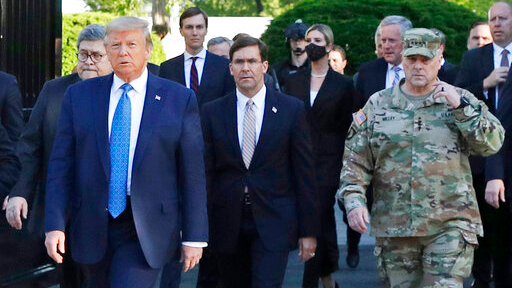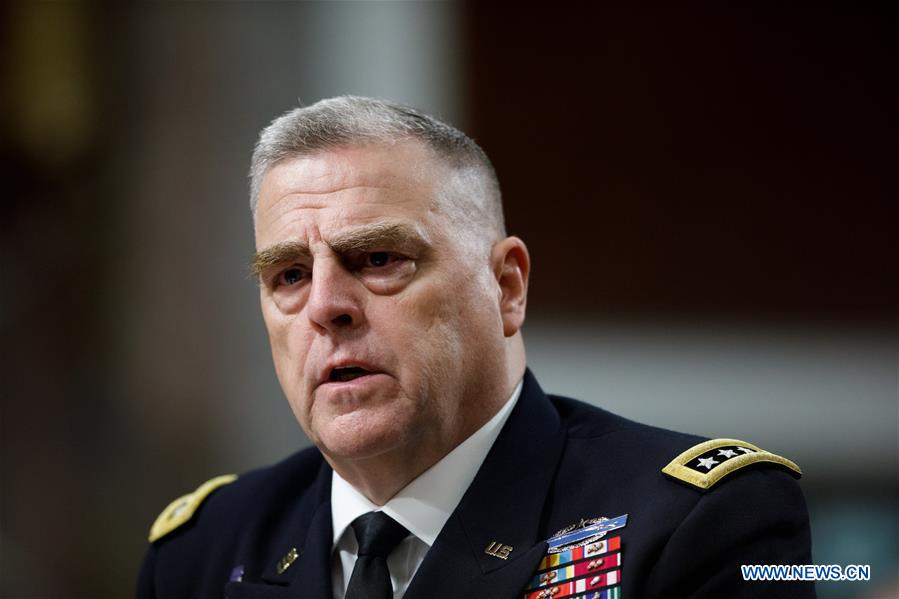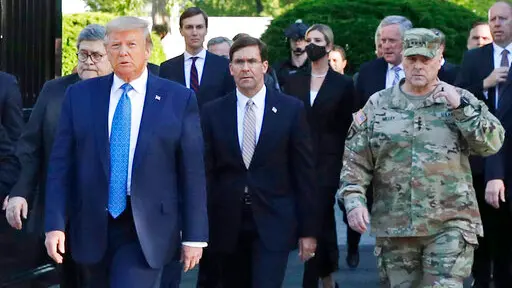
President Donald Trump departs the White House to visit outside St. John's Church, in Washington, the United States, June 1, 2020. /AP
Editor's note: Josef Gregory Mahoney is a professor of politics at East China Normal University. The article reflects the author's opinion, and not necessarily the views of CGTN.
In a new report, the chairman of the Joint Chiefs of Staff Mark Milley, the highest ranking and most senior military officer in the United States, has announced his regret for attending a highly polarizing photo-op conducted by President Donald Trump near the White House, when police under White House command teargassed peaceful protestors.
A week ago, given Trump's repeated threats to override state governors and use the Insurrection Act to mobilize American troops against Americans, former Secretary of Defense James Mattis declared publicly that Trump represented a threat to the U.S. Constitution. The man who succeeded Mattis in that position, Mark Esper, also expressed publicly his unease with Trump's policies in this matter.
Trump's threats to use the military has ignited concerns among some that Trump aims to create a military dictatorship, while others worry that the remarks from Mattis, Esper and Milley indicate a military coup against Trump is developing.
In fact, while these developments represent a significant challenge to Trump's authority, present a potential Constitution crisis and arguably undermine U.S. security, none of these outcomes is likely.
Civilian command
Civilian command of the U.S. armed forces is one of the bedrocks of American democracy.
Constitutionally, the president is the commander-in-chief and ranks first in the chain of command, followed by the secretary of defense. Generally, official orders are transmitted from the president to the secretary to the chairman of the Joint Chiefs of Staff and the commanders of the combatant commands, who then implement them militarily.
Legally, the structure of civilian command was in place when the U.S. Constitution went into effect in March 1889. A month later, General George Washington, who had led American forces to victory over the British in the War of Independence, took office as the first president, but as a civilian. In fact, the term commander-in-chief was conferred previously on Washington by the Continental Congress in 1775, as the then-American colonies girded for revolution. While Washington made a natural choice for first president, his military experience as commander-in-chief during the war was also a natural fit for stepping forward with civilian command. New laws clarifying and updating civilian authority have emerged overtime, most notably in 1947, 1956 and 1986.
Civilian authority has faced a number of well-known challenges.
One, known as the "Revolt of the Admirals," came in 1947, against then-President Harry Truman, when naval officers objected to downsizing fleets after World War II. Although Truman prevailed, his preferred doctrine of nuclear deterrence was altered significantly once the Soviet Union successfully tested its first nuclear weapon in 1949, and again with outbreak of the Korean War in 1950.
Perhaps, the best known challenge came when General Douglas MacArthur effectively disobeyed Truman's orders and questioned the president's authority while secretly working to expand the war to include all of China.
When this disagreement became publicly known, Truman was forced to fire MacArthur. An extremely popular war hero in the U.S., the firing sparked a constitutional crisis, with a large majority of Americans supporting MacArthur. This outcome severely impacted Truman politically and was one of the major reasons he decided not to run for re-election.
Years later, in 1973, in one of his more colorful quotes, Truman remarked on the episode: "I fired him because he wouldn't respect the authority of the President. I didn't fire him because he was a dumb son of a bitch, although he was, but that's not against the law for generals. If it was, half to three-quarters of them would be in jail."
Over time, the MacArthur episode has served as a cautionary tale.
On the one hand, despite his continued status as a respected war hero, most now believe MacArthur crossed too many lines and that his firing ultimately preserved both the tradition and legality of civilian command.
On the other hand, it also revealed that leading generals, particularly popular ones, could be quite damaging to civilian leaders if conflicts erupted between them, and even if the general remained effectively quiet.

Gen. Mark Milley testifies before the Senate Armed Services Committee on his nomination to be chairman of the Joint Chiefs of Staff on Capitol Hill in Washington D.C., the United States, July 11, 2019. /Xinhua
The seeds of Trump's poor relationship with the U.S. military
One of the ironies of the current crisis is that few American presidents have been as outwardly generous to the U.S. military as Trump.
In addition to expanding military budgets, he's included many generals in his cabinet — even necessitating special exemptions to do so to preserve the image of civilian authority. He's worked to extract troops from hopeless conflicts that had gradually exhausted U.S. forces. And in his various campaigns and rallies, he's promoted pride in the military as a crucial part of his "Make America Great Again" project. He's even created a new branch of military, the U.S. Space Force.
Nevertheless, Trump's relationship with the military has had its problems.
Firstly, Trump is not a veteran. The scion of a wealthy family, and despite graduating from a military academy, Trump avoided being drafted for the Vietnam War and through a strategy of repeated deferments. Ultimately, he managed to get himself declared medically unfit to serve for bone spurs in one of his feet, although he could not remember when asked in 2015 which foot was affected.
Whether or not the allegations are true, avoiding military service in a time when it was required has struck many as yet another example of a man of privilege effectively draft-dodging. While other U.S. politicians have faced similar concerns, none have as directly as Trump. In fact, in today's age, with many convinced that America's involvement in Vietnam was immoral, avoiding the draft has come to be seen as being almost honorable.
Nevertheless, Trump undermined this position when he publicly mocked Senator John McCain, a decorated war hero and former prisoner of war in Hanoi, for getting caught by the Vietnamese during that conflict.
More recently, Trump has issued presidential pardons to three U.S. service members convicted by their peers of war crimes, overriding military command, and has publicly promoted as war heroes instead.
Furthermore, Trump has also indicated he supports torturing prisoners of war and expanding who can be classified in that category. Publicly, military leaders have not only recoiled from this, military law prohibits it. Currently, ordering a U.S. service member to torture another person would constitute an unlawful order even if it came from the president, and the service member could face legal consequences if he followed it.
The current crisis
While hyperventilating pundits on opposite ends of the political spectrum worry over coups in one form or another, the more immediate crisis centers on three concerns.
First, has Trump's authority with the military been so undermined that his ability to command it has been compromised? This, in a nutshell, is a constitutional crisis.
Second, if this is true, what are the implications for national security?
Third, if Trump invokes the Insurrection Act and deploys troops in a highly charged political environment, especially while he's running for re-election and despite warnings from military leaders and state governors, are we likely to see further damage to the nation, the military and the U.S. Constitution?
This is the crisis facing a nation reeling from failed containment efforts related to COVID-19, an ongoing economic collapse including a real unemployment rate exceeding 20 percent, and from spiraling protests for racial justice.
(CGTN)
 简体中文
简体中文





